When Writing A Résumé, Why Is It Important To Include As Many Relevant Keywords As Possible?
Are you qualified to be hired?
According to recent reports 75% of HR professionals admit there is a shortage of skills in candidates for job openings. What do they mean by "skills," though?
Skills are your natural talents and the expertise you develop to perform a task or a job. Life skills help you deal with daily tasks in all areas of life while professional skills allow you to perform specific work duties. There are several key types of skills: soft skills, hard skills, domain-general, and domain-specific skills.
But how do you list skills on a resume to land that interview?
Don't worry, in a few minutes, you'll learn exactly what to do.
This article will show you:
- Examples of 99+ best skills to put on a resume for all types of jobs.
- What skills to include on a resume to get more interviews for great positions.
- Where to put work skills on a resume so that recruiters actually believe you.
- How to write about key skills on a resume.
Want to save time and have your resume ready in 5 minutes? Try our resume builder. It's fast and easy to use. Plus, you'll get ready-made content to add with one click. See 20+ resume templates and create your resume here.
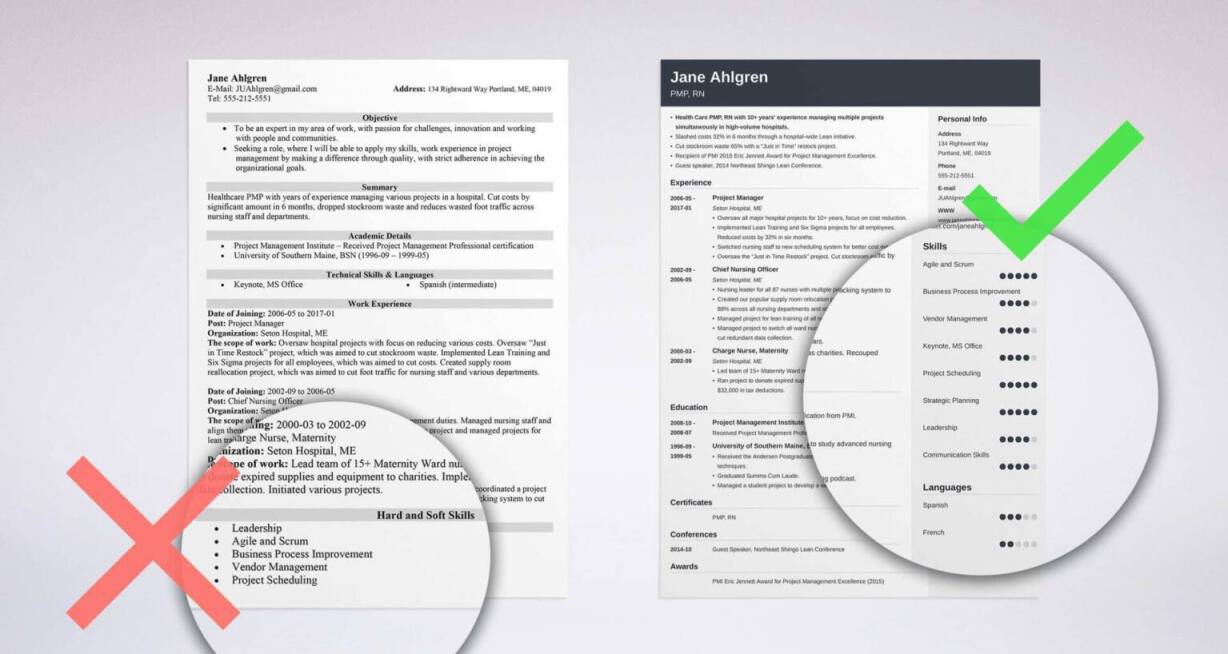
Sample resume made with our builder—See more templates and create your resume here.
1
Top Skills for a Resume in 2021
These are the key skills you should include in your resume:
- Creativity.
- Interpersonal Skills.
- Critical Thinking.
- Problem Solving.
- Public Speaking.
- Customer Service Skills.
- Teamwork Skills.
- Communication.
- Collaboration.
- Accounting.
- Active Listening.
- Adaptability.
- Negotiation.
- Conflict Resolution.
- Empathy.
- Customer Service.
- Decision Making.
- Management.
- Leadership skills.
- Organization.
- Language skills.
- Administrative skills.
The best part? "Soft" skills listed above are very much transferable skills. Such ablilities are universal and not associated with a particular job or industry—they'll make fantastic employment skills no matter the job title.
This means you should add a few of your most relevant soft skills to a resume whatever job you're applying for. That's especially important if you're a recent graduate seeking an entry-level position:
Studies have shown that the most important things to put on a resume for entry-level candidates are all soft skills:
- problem solving (83% of employers)
- teamwork (83%)
- written communication (80%)
- and leadership (72%).
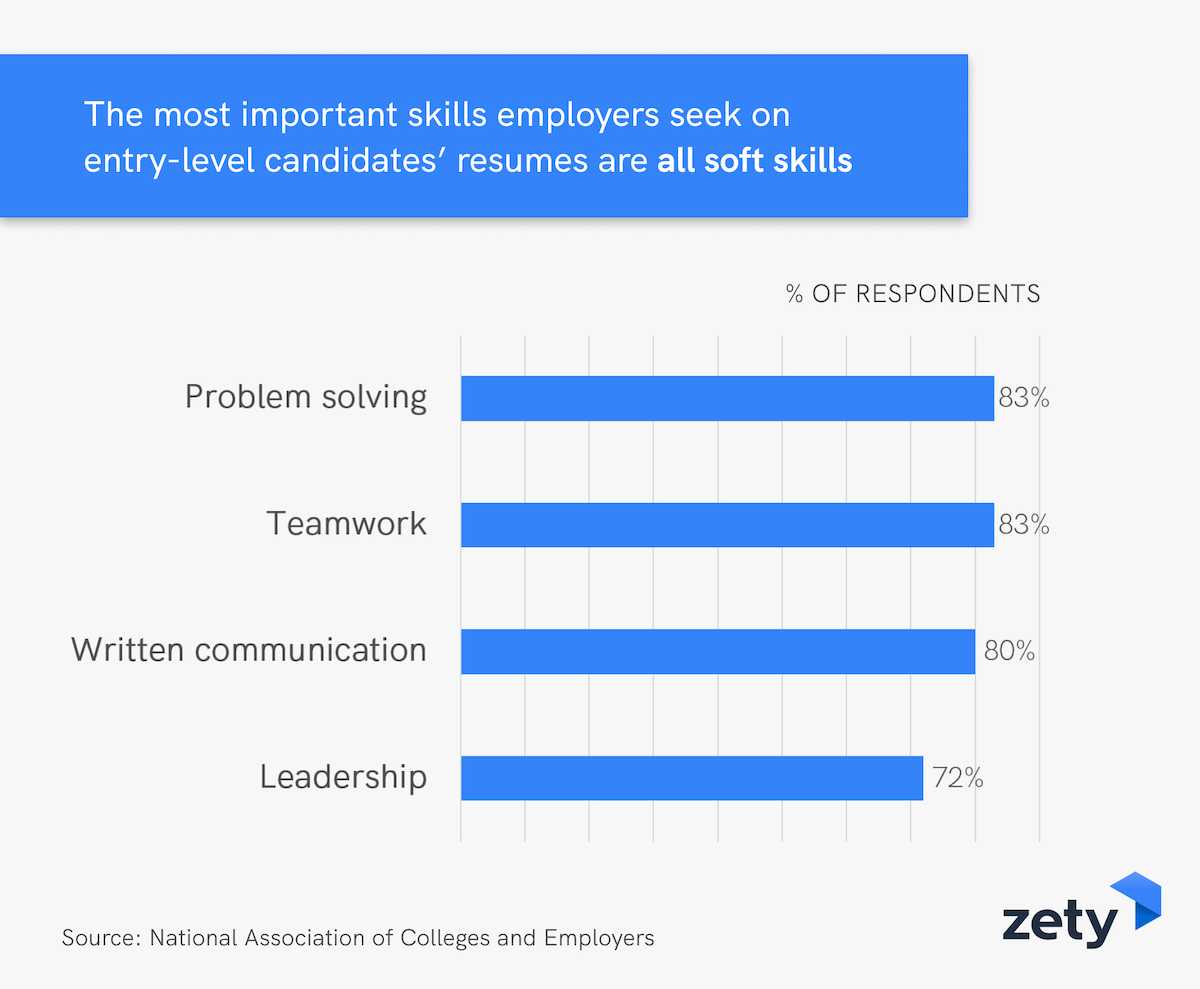
See more examples of soft skills and step-by-step instructions for how to list them on a resume: The Best Soft Skills to Put on a Resume
Don't know what skills are best for you? Tired of overthinking what to include? Our builder will do the job for you.
When making a resume in our builder, drag & drop bullet points, skills, and auto-fill the boring stuff. Spell check? Check. Start building professional resume template here for free.

When you're done, Zety's resume builder will score your resume and tell you exactly how to make it better.
Wait, there is a catch—
For a job-winning resume, you'll need a good mix ofsoft andhard skills.
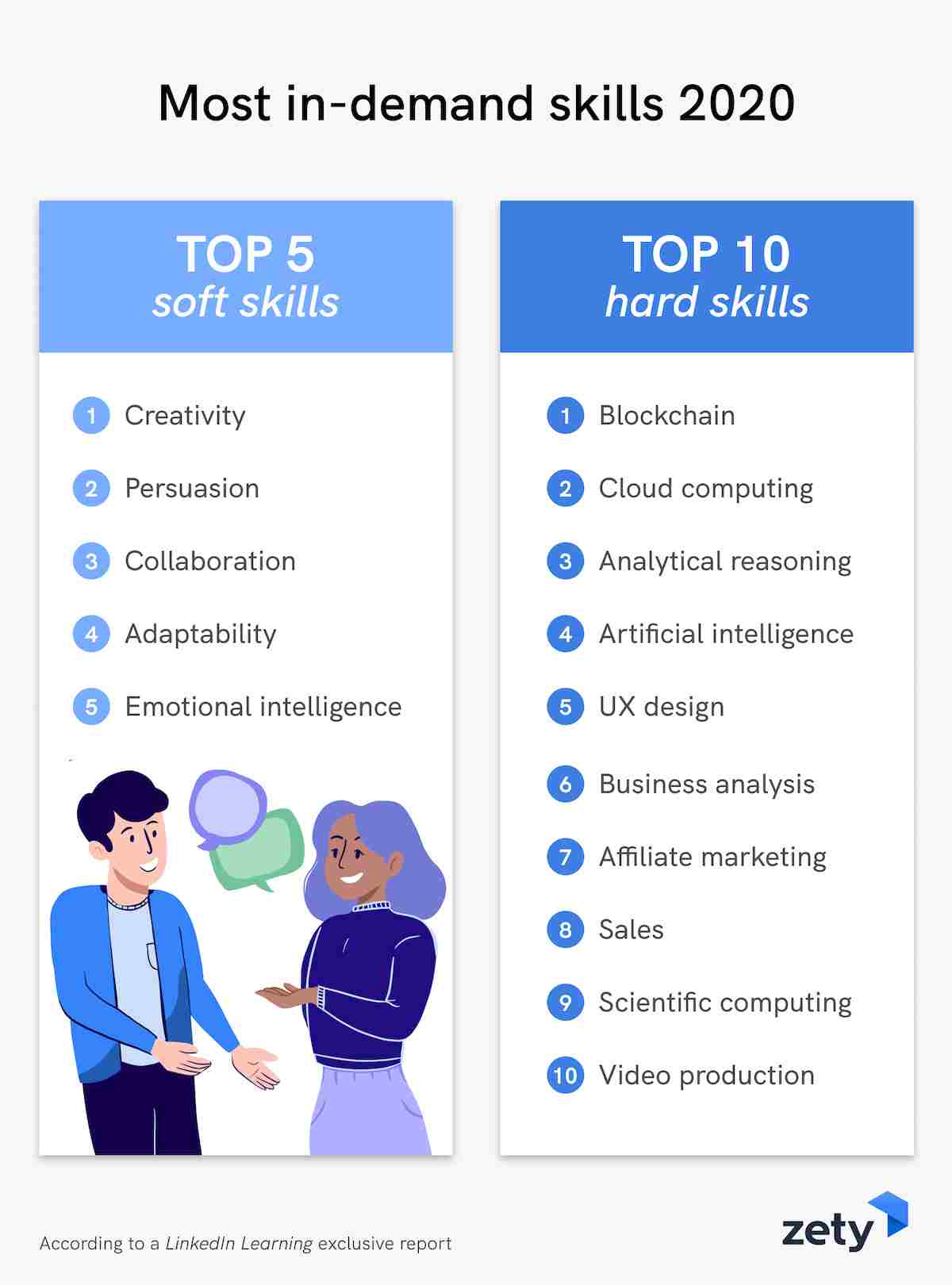
The difference between hard skills and soft skills
Hard skills are abilities you learn on the job, through formal education, or additional training. They are teachable, measurable, and related to a specific job. For instance, if you work in customer service, your hard skills will include Zendesk, data-entry, and product knowledge.
On resumes, hard skills show what you can do. Soft skills indicate how you'll perform your duties.
Why do you need to list both types of skills on a resume? Think about it this way:
- If you only displayed soft skills, you'd be a "nice person" not qualified for any job.
- If hard skills and technical skills were your only capabilities, you'd be a robot unable to function in any work environment.
Learn more about soft vs. hard skills and get tips for how to balance them on a resume. Read: Hard Skills vs. Soft Skills for a Resume
Typical hard skills for the most common jobs
Office and Administrative Jobs
- Data Entry
- Answering Phones
- Billing
- Scheduling
- Microsoft Office skills
- Office Equipment
- QuickBooks
- Shipping
- Welcoming Visitors
- Salesforce
- Calendar Management
Sales, Retail, and Customer Service Jobs
- Product Knowledge
- Lead Qualification
- Lead Prospecting
- Customer Needs Analysis
- Referral Marketing
- Contract Negotiation
- Self Motivation
- Increasing Customer Lifetime Value (CLV)
- Reducing Customer Acquisition Cost (CAC)
- CRM Software (Salesforce, Hubspot, Zoho, Freshsales)
- POS Skills
- Cashier Skills
- Good Communication Skills
Nursing and Healthcare
- General Nursing Skills
- Patient Assessment
- Taking Vital Signs
- Patient Care
- Recording Patient Medical History
- Wound Dressing and Care
- Urgent and Emergency Care
- Record-Keeping
- Patient Education
- NIH Stroke Scale Patient Assessment
- Electronic Medical Record (EMR)
- Medicine Administration
- Blood Pressure Monitoring
- Phlebotomy
- Rehabilitation Therapy
- Hygiene Assistance
- Use of X-Ray, MRI, CAT Scans
- Meditech
- Glucose Checks
- Electronic Heart Record (EHR)
IT Jobs
- Programming Languages
- Web Development
- Data Structures
- Open Source Experience
- CodingJava Script
- Security
- Machine Learning
- Debugging
- UX/UI
- Front-End & Back-End Development
- Cloud Management
- Agile Development
Engineering & Technical Jobs
- STEM Skills
- CAD
- Design
- Prototyping
- Testing
- Troubleshooting
- Project Launch
- Lean Manufacturing
- Workflow Development
- Computer Skills
- SolidWorks
- Budgeting
- Technical Report Writing Skills
Advertising and Marketing
- SEO/SEM
- PPC
- CRO
- A/B Testing
- Social Media Marketing and Paid Social Media Advertising
- Sales Funnel Management
- CMS Tools
- Graphic Design Skills
- Email Marketing Skills
- Email Automation
- Data Visualization
- CPC
- Typography
- Print Design
- Photography and Branding
General Management and Project Management
- Agile
- Managing Cross-Functional Teams
- Scrum
- Performance Tracking
- Financial Modelling
- Ideation Leadership
- Feature Definition
- Forecasting
- Profit and Loss
- Scope Management
- Project Lifecycle Management
- Meeting Facilitation
- Managerial Skills
- Organizing Skills
Hungry for more hard skills examples and expert tips for how to list them for the greatest impact? See our article: Hard Skills: Definition & List of Best Examples for Any Resume
Didn't see a set of skills that sounds like you? Don't worry. We've curated a list of 500+ resume examples for virtually all jobs. Each example contains dozens of skills you can pick from: 500+ Resume Examples for All Jobs and Careers
Use the right skills, and you'll be automatically ahead of 3 out of 4 competitors: let's stress this once again, 75% of hiring decision-makers think job candidates aren't sufficiently skilled.
2
How to List Skills on a Resume
The best method for creating a resume with all the right skills boils down to two things:
- What skills to choose.
- Where to put them.
Here's how to put skills on a resume:
1. Keep your resume skills relevant to the job you're targeting.
If there's one takeaway here, it's this:
Customize the skills list on every resume you send to match the requirements of the job offer.
This way, you'll achieve two crucial things:
- Show recruiters that you're made for this job specifically.
- Beat resume-screening bots that scan resumes for relevant keywords.
How to make a resume skills list tailored to the job ad?
- Start with a "master" list of all your professional skills. Note down all your professional skills in a spreadsheet (or on a piece of paper if you prefer the analog way)—list everything that makes you good at your job, both hard and soft skills.
- Read the job description carefully. Pay attention to a "Requirements" or "Key Skills" section of the job ad.
- Look for skills-related words and phrases such as "meticulous time-management," "knowledge of XYZ software," "proficient in Lean management" and so on. Jot them down.
- Compare your master list of skills with those you see in the job ad. All those that match have to go on your resume.
- But don't stop there! If the job ad calls for other skills you think you have, but forgot to enter on your master list, mention those on a resume, too.
- Tell the truth, though. If you exaggerate your qualifications on a resume, recruiters will find out at some point.
Let's see how that works in practice. Below, you'll a sample job ad for a customer service representative.
See those keywords marked in yellow? Those are the key skills and qualifications successful candidates will have to list and prove on their resumes.
Key Skills in a Job Ad
Job Summary:
- Present a professional image with a positive demeanor daily
- Initiate customer interactions and engage with prospects
- Educate customers about our clients and the value of their products
- Provide support and resources that solidify the interest of customers
- Establish rapport to pinpoint customer preferences and adapt accordingly
- Become an expert in the characteristics of the products and services offered
- Collaborate with the Customer Service Team to complete objectives
Desired Skills:
- You're able to make decisions and solve problems
- You are able to empathize with customers in a genuine way that lets them know you care about their issues
- You're a team player that can follow and lead as situations dictate
Requirements:
- 2-5 years of experience working with customers in a technical role
- Excellent written and verbal communication
- Experience with JIRA, Zendesk, Salesforce or other support tools
Now that you know what's expected of you, show you have the skills they need.
2. Include key skills in a separate skills section.
This way, you'll help recruiters spot strengths on your resume in a flash.
Use a standalone skills section where you put your most important qualifications. Make sure to:
- Be specific and precise ("Written and verbal communication," instead of "good communicator").
- Divide the skills by categories: usually, "Hard Skills" and "Soft Skills."
- Use no more than 10 skills in total.
There are several formats you can opt for. We'll cover them referring to the above list of job skills marked in a job ad.
Bulleted List of All Skills
A simple-yet-effective method. Include a list of skills the employer wants and let the rest of your resume provide evidence you actually have them.
Hard Skills:
- Providing customer support
- Product knowledge
- JIRA
- Zendesk
- Salesforce
Soft Skills:
- Decision-making
- Written and verbal communication
- Teamwork and collaboration
- Empathy

Brief Descriptions of Your Proficiency Level
You can also indicate how advanced your abilities are using descriptive words such as "Advanced," "Intermediate," or "Basic."
See the example below:
Hard Skills:
Customer support: expert
Product knowledge: advanced
Soft Skills:
Decision-making: expert
Written and verbal communication: advanced
Teamwork and collaboration: basic
Software:
JIRA: advanced
Zendesk: intermediate
Salesforce: intermediate
Want to up your skill descriptions game? Use simple graphics such as bar charts or boxes (yes, our builder does that for you).
Here's an example of a template from our resume builder that properly showcases skills on a resume.
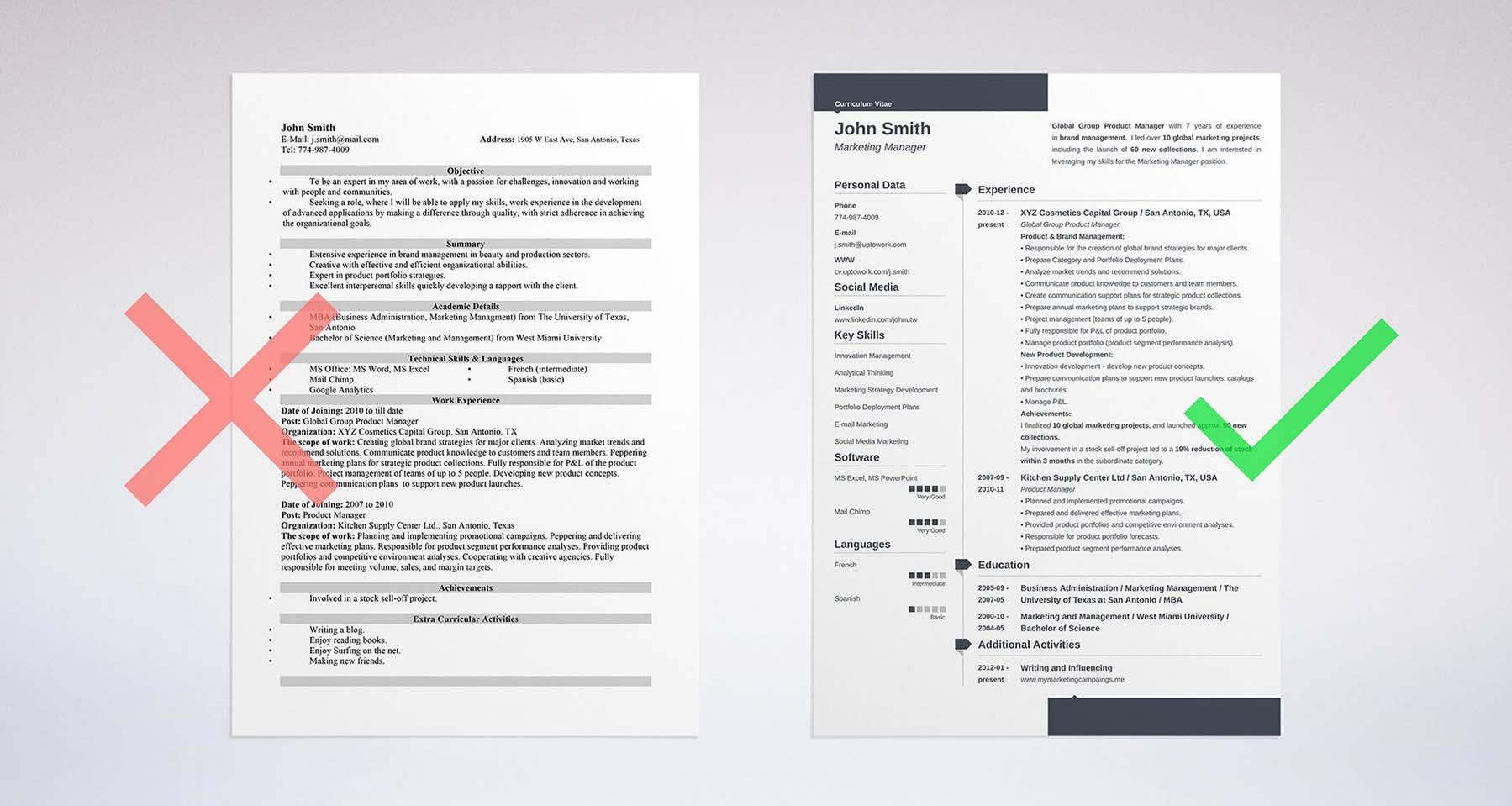
Sample resume template - See 20 other templates and create your resume here.
Skills Summary (for Functional or Combination Resumes)
Finally, if you choose to write use a skills-based resume format or a combination resume format, you can put a more extensive skills summary at the top.
Select up to 4 most important skills and use them as headings. Below each heading, include examples of achievements that illustrate that skill and start each bullet point with resume action words.
Key Skills
Customer support
- Boosted new customer NPS scores by 10%.
- Maintained customer retention rate 40% above the company average.
- Processed and average of 200 weekly orders from customers, distributors, and agents.
Product knowledge
- Answered product and service questions and offered information on related products and services.
- Helped to resolve a recurring product complaint by identifying a major process bottleneck. Reduced tickets by 70%.
Tools and software
- JIRA
- Zendesk
- Salesforce
- MS Office
- Google Drive
If you think this solution will work best for you, learn how to write a skills-based or a combination resume:
Functional Resume Samples
Combination Resume Samples
How many skills should you list on a resume?
You should list between 5 and 10 skills on a resume, depending on how you choose to present them. For bulleted lists of software programs, hard skills, and soft skills, around 10 is the sweet spot. In functional, skills-based resumes, focus on 4–6 most relevant general skill sets.
3. Add your work-related skills in the professional experience section.
Here's how it works:
A recruiter, we'll call her Wendy, glances at your resume.
She spots the skills section.
"Huh, this candidate looks solid," she says. "Let's see if he can put those skills to good use."
Where will Wendy look next?
That's right, your work history section with descriptions of past jobs.
This is where you have to prove you can apply your skillset in real-life professional situations.
Skills in a Resume's Work Experience Section
Customer Service Representative
XYZ Corp
Long Island, NY
2018–Present
- Displayed expertise in the characteristics and features of 100+ flagship products.
- Provided support to clients in highly technical roles.
- Worked with a team of 20+ CSRs and Sales Reps, applying Agile frameworks to solving unexpected problems such as new complaint types.
- Trained new hires in using support tools: JIRA, Zendesk, and Salesforce.
- Commanded by supervisors for quick and efficient decision-making.
See that? Now all those skills mean something to Wendy.
In your work life, practice is more important than theory after all.
To learn more about how to include skills and abilities in a resume work experience, see: Work Experience on a Resume: Duties, Skills, Achievements
4. Weave the most relevant skills into your resume profile.
You have a solid work skills list for a resume.
You don't just tell recruiters about your skills. You show them in the work experience section.
Time for the cherry on top—an overview of your skills in the resume profile or summary of qualifications.
A resume profile is that short paragraph at the top of your resume. Its purpose is to give an overview of your career and explain why you're an ideal candidate.
Depending on your career level, you'll write it as either a resume summary (for experienced candidates) or a resume objective (for entry-level job seekers).
Yes, you guessed it—for the best resume you need to mention few of your most relevant skills in the profile, too. Remember:
What matters most is what skills the employer expects of you.
Let's stick with our example of a customer service job. The job ad calls for skills in:
- Supporting customers in technical positions.
- Problem-solving
- Support tools and software
See how this candidates shows his skills in 1, 2, and 3.
Job Skills Highlighted in a Resume Profile
Customer service specialist with 2+ years of experience working with clients in highly technical roles (1) seeking a Customer Service Associate position with ABC Company. Applied Agile frameworks to facilitate problem-solving procedures (2) for new complaints, slashing ticket resolution time by 40%. A power user of JIRA, Zendesk, and Salesforce (3).
What makes it so great?
Upon reading a 50-word-long paragraph, the recruiter already knows the candidate is skilled in everything that counts for this job.
Pro Tip: You can even include skills in your list of interests section. If you have a hobby or interest that demonstrates skills relevant to the job then it's worth including.
See tips for making the most of your skills for a job in a resume summary or objective. Read: Resume Summary Samples and Professional Resume Objectives
5. Make sure to add the most in-demand skills.
Certain skills are particularly sought-after in today's job market.
I'm not saying you should make your skills up, but—
If you are an expert in one of the most in-demand skills, it's a good idea to add it to your resume, even if the job ad doesn't explicitly call for it.
LinkedIn Learning published a report, based on their exclusive data, revealing the top 25 skills for employers today:
- Cloud Computing
- Artificial Intelligence
- Analytical Reasoning
- People Management
- UX Design
- Mobile Application Development
- Video Production
- Sales Leadership
- Translation
- Audio Production
- Natural Language Processing
- Scientific Computing
- Game Development
- Social Media Marketing
- Animation
- Business Analysis
- Journalism
- Digital Marketing
- Industrial Design
- Competitive Strategies
- Customer Service Systems
- Software Testing
- Data Science
- Computer Graphics
- Corporate Communications
Plus, a great cover letter that matches your resume will give you an advantage over other candidates. You can write it in our cover letter builder here. Here's what it may look like:

See more cover letter templates and start writing.
Key Takeaway
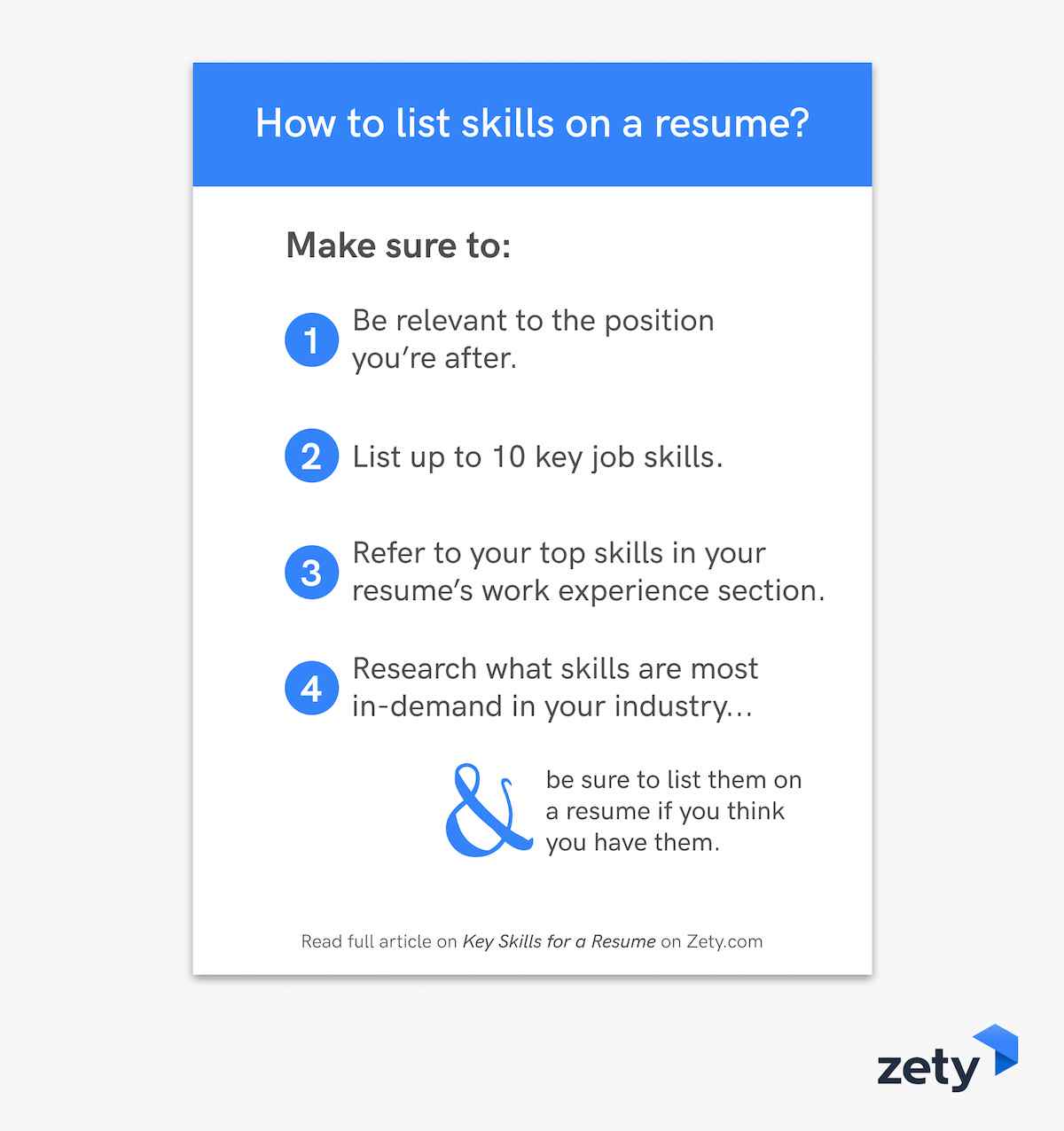
Here's how to list skills on a resume for a job:
- Be relevant to the position you're after: pay attention to required skills mentioned in the job ad and list those on your resume.
- Create a legible, separate skills section: list up to 10 key job skills, optionally adding descriptions of your proficiency level.
- If you're writing a functional (skills-based) or a combination resume, create a skills summary and put it at the top: use 4 most relevant skills as subheadings, add achievements that validate each skill below.
- Refer to your top skills in your resume's work experience section to show how you put your abilities to use.
- Add 2–3 most relevant skills to your resume profile—a summary or objective.
- Research what skills are most in-demand in your industry and be sure to list them on a resume if you think you have them.
Thanks for reading my article. Now, I'd love to hear from you. What are the biggest challenges when putting skills on resumes? What skills do you think are the most crucial? Do you need further assistance with your resume skills list? Drop me a line in the comments. Let's chat!
Rate my article: what skills to put on a resume
Average: 4.17 (1490 votes)
When Writing A Résumé, Why Is It Important To Include As Many Relevant Keywords As Possible?
Source: https://zety.com/blog/what-skills-to-put-on-a-resume
Posted by: banksyessist.blogspot.com

0 Response to "When Writing A Résumé, Why Is It Important To Include As Many Relevant Keywords As Possible?"
Post a Comment